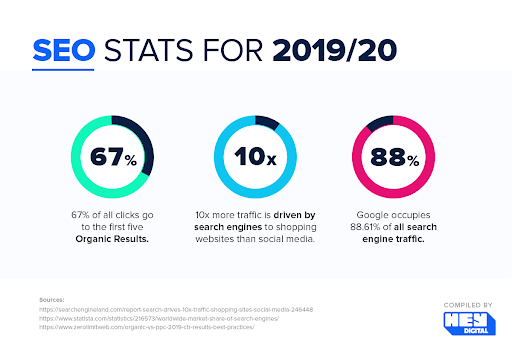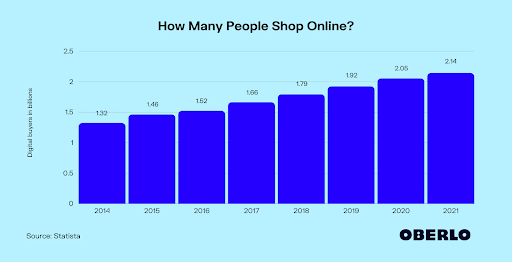With every year that goes by, it becomes more important for brands to establish their online presence. Programmatic SEO is vital to this. To understand why, we’re going to take a quick look at what SEO is.
One crucial way companies are trying to enhance their online brand is by investing time and effort into SEO (search engine optimization). This is all about getting your web pages to rank as highly as possible in search results for relevant terms.
For example, if your page is about creating an SEO strategy, the goal would be to have it show up in the first few results for search terms like ‘strategies for SEO’, ‘best SEO strategy’, and other similar phrases.
As of 2019, SEO is especially important, considering that the first five (non-advertisement) results received well over half of all clicks in every major search engine:

Source: Vixen Digital
In other words, SEO is a hugely helpful tool for drawing more people to your website and, by extension, your brand. But what does the term ‘programmatic’ have to do with it, and why is programmatic SEO in particular so fantastic?
We’re going to get into the details and really explore programmatic SEO at length, one question at a time.
What is programmatic SEO?
Programmatic SEO is a tool that lets you create large numbers of pages using specialized code. The pages it creates for you are based on keywords, which you select or input to tell the program what sorts of pages it should make.
Programmatic SEO can help you create a lot of different yet similar landing pages that target specific keywords and/or variations on groups of keywords. This way, you can ensure potential customers find their way to a landing page tailored to the keyword they typed into their search engine.
What makes programmatic SEO so important?
With programmatic SEO, you can ensure you’ve got a dedicated page for every category, product, and/or service available on your website. You also get to avoid creating each of these pages yourself, which saves time, money, and effort.
Since each of these pages is tailored to a highly specific keyword (or set of keywords), they’ll all have an easy time ranking highly in organic search results.
A quick bit of context: organic search results are the first ones that come up when a user types in a given keyword or phrase. Advertisements don’t count as part of organic search results. The thing that makes them ‘organic’ is that they earn their spot using SEO, not by paying for it.
Programmatic SEO lets you get more of your content in those organic search results with minimal effort. All you need to do is a bit of keyword research to find out which terms you want your chosen programmatic SEO tool to create content for. The rest is taken care of for you.
That means programmatic SEO has the power to drive massive amounts of traffic to your website, without needing extra work on your business’ end. You won’t need to hire people to meticulously create and curate content for potentially hundreds of web pages and Google snippets, which saves you money and time.
You’ll also be able to direct your employees to other kinds of work since the task of creating these landing pages no longer falls to them.
In short, programmatic SEO is so important because it’s a huge asset for your business.
[Ebook] Automating SEO with Oncrawl
Who can benefit from programmatic SEO?
Anyone whose business and/or digital marketing strategy involves establishing an online presence in any way can make use of programmatic SEO.
The more landing pages a given business needs, the more helpful programmatic SEO will be. This is particularly true for companies that operate within the travel and real estate sectors, as well as anyone involved in eCommerce. Retail companies can also make good use of programmatic SEO since they’ll have plenty of products that could use individual landing pages.
If your business could use some work in the SEO department, programmatic SEO will be a very useful tool for you. The same is true for any business that wants to make their products easier to find or that wants their pages to start seeing heavier traffic.
Let’s take a look at some more specific industry examples of programmatic SEO.
Programmatic SEO is particularly relevant for specific types of websites like those related to travel or reviews.
Tripadvisor, for instance, has a web page for almost every travel related query. If someone searches “Best things to do in (city)” you can be sure that Tripadvisor will be in one of the top results. This is due to programmatic SEO. Tripadvisor uses programmatic SEO to target keywords and optimize their landing pages to reach as many people as possible. They do this for thousands of transactional landing pages all related to the travel industry—which makes Tripadvisor one of the most trusted sites for all things travel.

Another example is popular review website Yelp. They’ve leveraged programmatic SEO to target keywords related to a specific place. So if you search for a restaurant or bar in Google, there’ll be a Yelp page in the top search results. This way, they’ve been able to target specific search queries rather than more general ones.
The top three benefits of using programmatic SEO
As we’ve established already, programmatic SEO has immense potential to boost organic search result rankings. It can also help get more clicks for your web pages and, by extension, help you reach a wider audience.
These are just a few of the benefits that come with using programmatic SEO. Let’s take a look at some of the others:
1. Ensuring business continuity
Have you ever wondered what the future of your business might look like? If a whopping 2.14 billion digital shoppers – or just over one-quarter of the world’s population – are any indication, the future of all businesses depends on how well they can adapt to marketing online.
The data (which you can see below) shows the number of people choosing to shop online is going up with each year that passes. In other words, your potential market is only getting bigger. That’s all the more reason why making sure your strategy accounts for online marketing is very, very important.

Source: Oberlo
If you want to ensure business continuity, you’ll need to invest time and effort into business continuity management software that will help your business continue to operate even in the face of unprecedented change.
The massive shift to online commerce that came with the pandemic is just one example of the sort of changes this software can help you to weather. So where does programmatic SEO come in?
That’s simple: it makes any digitally-based and PRM marketing strategy instantly more effective and extends your online reach. To put that another way, programmatic SEO makes it easier to establish and expand your online presence.
Having more of a digital presence is a great way to ensure you’ve got business continuity. In the event of natural disasters, pandemics, or other similar circumstances, the online market is still going to be fine. By getting more involved with that market using programmatic SEO, you’re ensuring your company will benefit from that continuity.
2. Building useful links
When you’re in the process of trying to optimize SEO scores, it’s important to make sure your pages have enough internal links that your site visitors are always able to find something to click on with relative ease.
This can make it tempting to create a large volume of pages… with subpar content quality. This actually works against you. When your links take potential customers to pages full of useless content or with so little content they may as well be empty, those potential customers don’t become actual customers.
It doesn’t help that Google’s algorithm hates this kind of content even more than your site viewers do.
That’s why you’ll want to make sure your pages are all substantial, useful, and ‘meaty’ enough to merit being linked to. Programmatic SEO makes this happen.
3. Redirecting effort productively
These days, the problem is not that people don’t want to work hard. Instead, it’s that they don’t know how or what they should be working hard on.
Any company that can eliminate sources of wasted effort is a company that’s got more human resources to sink into getting projects done. If you’re finding your employees are spending too much time trying to manually update your pages to improve SEO, that’s a clear sign that it’s time to find a way to create pages that are already SEO optimized.
Alongside other helpful tools like affiliate tracking platforms and an automation center of excellence for your company, programmatic SEO is one of the most effective ways to make this redirection of effort happen.
The great thing about programmatic SEO is it works harmoniously in tandem with other tools (like the CE mentioned above). That’s because it can more or less be set up and then left alone until new keyword entries are put in. This leaves human employees free to invest their time and energy into other things.
How to do programmatic SEO
Here’s a brief overview of how to implement a programmatic SEO strategy to improve your search engine visibility.
Find your keywords
There are different types of keywords to look out for, mainly:
Head terms
These keywords include the broad level terms you’re trying to rank for. For instance, a head term for a website like Tripadvisor might be “hotels” or “things to do”. For a website like Yelp, head terms might include “restaurants” or “bars”.
These keywords hold a lot of search volume. You can use tools like Google Trends to check their search volume or find related searches. Head terms are often associated with modifiers, which brings us to our next type of keyword.
Modifiers
These are keywords that are related to your head terms, but are used to create more specific search queries. Likely, these terms will have a lot more search volume. This category is split into two main types of modifiers: primary and secondary.
Primary modifiers create a whole new category of search term. A primary modifier of the search term “restaurant” could be “Korean restaurant” or “Italian food”.
Secondary modifiers describe the head term. A secondary modifier of the same head term might be “cheap restaurants” or “restaurants near me”.
Once you’ve collected all your head terms and modifiers, put them all together in a list to keep your keywords organized.
Do a competitive analysis of search results
Type your keywords into Google to find out which websites are achieving the top results—those are your top competitors.
Once you’ve identified your top competitors, you can use a keyword tool to find out which keywords and how many they rank for. Tools like Ahrefs, SEMrush or Moz are useful for this. You can also analyze direct competitor backlinks and user experience patterns.
Armed with this information, you can understand what your competitors are doing right and figure out how you can use programmatic SEO to reach their level.
Build your landing pages
Programmatic SEO is all about building landing pages at scale which are all unique. One of the best strategies for this is to create landing pages around keyword-related search intent. Remember that you don’t define what search intent is for your users, instead, this is determined by Google’s algorithms. Spend some time looking at the SERPs to understand which key terms rank and what the search intent is behind them. A good tip for doing this is to look at “Searches related to” section of the SERPs.
Although your landing pages may contain a lot of the same information, images, maps, reviews, and so on. However, they can’t be exactly the same. Each landing page should feature enough unique content that the algorithm perceives it as offering unique value to visitors.
Avoid doorway pages which, according to Google, are “sites or pages created to rank highly for specific search queries.” The key is to build landing pages at scale while still providing value to users.
Boost your online visibility with programmatic SEO
We’ve seen how essential SEO is to a business’s success in online spaces and in terms of its digital marketing. By using it to their advantage, companies can reach larger audiences and make their websites more attractive to both potential customers and search engines.
Programmatic SEO is a tool that ensures you get the maximum amount of value. This value is called a return on investment. It’s a means of measuring just how useful your investment was by showing you what kinds of benefits you got from making it.
If you’re looking at the return on investment of SEO, a programmatic approach has the potential to be highly profitable. This is because all optimization takes a certain amount of money to make it work, but with programmatic SEO, this is minimal. There are relatively few human employees involved in getting it up and running and, once it’s established, it mostly doesn’t need any human interference.
In other words, you get to keep your human resources and reap the rewards of investing in this innovative form of search engine optimization.


